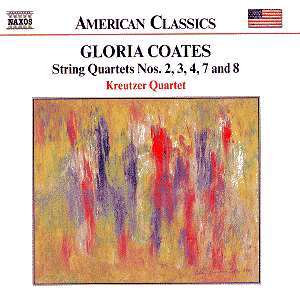In an interview the
cutting-edge American born composer
Gloria Coates chose the following pieces
of music as her five desert island discs
and stated, "… I would take with
me positive music such as ‘The Art of
Fugue’ by Bach, Mendelssohn's ‘Midsummer
Night's Dream’, Mozart's ‘Magic Flute’,
‘Magnificats’ by Orlando di Lasso, ‘The
Four Seasons’ by Vivaldi." This
is all very well, but Coates’ own demanding
music provides a stark contrast to her
conservative choices.
I live near a small
airfield where small planes are used
for flying lessons. For this reason
I am familiar with the persistent drone
of planes flying overhead which is evocative
of a substantial amount of the glissandi
contained in these five string quartets
from Gloria Coates. The aircraft-like
droning sound is achingly painful and
is a consistent thread.
This is certainly challenging
music borne out by the fact that even
as a teenage student Coates completely
perplexed her teacher by composing a
string quartet which consisted entirely
of glissandi. Coates’ music certainly
polarises opinion and it was interesting
to hear comments of members of my family
as they heard some of the music such
as, " I cannot imagine how anyone
could listen to this for pleasure"
and "this sounds like music to
be tortured by."
Please don’t think
I’m joking or trying to rubbish her
music because I am not. I am being deadly
serious and any listener new to the
innovative yet disturbing sound-world
of Coates deserves to know what to expect.
Words that come to mind as I listen
to the string quartets are: disturbing,
extreme, colourful, repetitive, thought-provoking,
imaginative, unrelenting, dissonant,
concentrated, austere and relevant.
Many of the CD covers
of Coates music have copies of her paintings
which show what a multi-talented artiste
she is; with a real imagination. Clearly
Coates’ imagination must be very vivid
to allow her to describe the seventh
String Quartet as ’Angels’; it is far
more evocative of a vision of hell to
me. The booklet notes describe the same
Quartet as being redolent of Christmas,
owing to musical quotations from several
Christmas carols. Christmas indeed!
Certainly not the type of Yuletide celebrations
that I wish to participate in; more
disaster season than festive season,
I feel! I really have become suspicious
of the descriptive sub-titles given
to contemporary compositions by their
composers. These usually serve the purpose
of mere marketing tools to provoke interest
in the work. This practice is nothing
new; it has been going on for centuries.
In fact, descriptive subtitles can often
be more of a hindrance than a help especially
if listeners cannot easily make the
same connection.
In these quartets the
crucial importance of glissandi cannot
be overstated together with liberal
use of canons, palindromes, ostinatos,
dissonant trills, tone clusters et
al. All extremely technical, yet
I feel that there is no real need to
understand all this. Just listen to
the music for what it is, not how it
is constructed. I am comforted that
Coates has stated that, "J.S. Bach
has been the greatest influence on my
music. For me his greatness lies in
his intense emotional expression pressed
into exquisite forms. His music has
always been an inspiration to me."
Ten out of ten for that!
To listen to this CD
in a single sitting is not recommended.
For me one work, or even one movement,
at a time would reveal Coates in the
best possible light. Often the listener
has to work extremely hard to become
familiar with the work of contemporary
composers. I fear, that the rewards
do not arrive before the required effort
diminishes. Coates music is certainly
in this category and tremendous endeavour
and perseverance is required. I cannot
help thinking that my appreciation of
this music would be enhanced by the
addition of a visual element; a nice
thought if totally impractical anyway.
The commitment and
technical prowess of the Kreutzer Quartet
(augmented by an organist and conductor
for the seventh String Quartet) is not
in question although how could one determine
the merit of their interpretations in
complex works such as these. Praise
is due to the Naxos engineers who have
excelled with the sound quality, although
just over sixty minutes of music is
not over-generous these days.
I am pleased to have
had the opportunity to listen to these
string quartets. Together with the earlier
recording of numbers one, five and six
(8.559091) Naxos have now recorded all
eight works. I cannot say that the experience
was entirely pleasurable because it
was not and I have been left with a
plethora of complex feelings by this
extremely challenging music. Will I
be returning to these works? I doubt
it somehow!
Michael Cookson
